HI5015 Legal Aspects Report: Citigroup's Australian Operations
VerifiedAdded on 2022/09/10
|8
|2425
|19
Report
AI Summary
This report examines the legal and regulatory framework affecting Citigroup's operations in Australia. It analyzes the company's compliance with the Australian Consumer Law, foreign exchange controls, and anti-money laundering regulations. The report further explores the impact of treaties, conventions, and agreements on Citigroup's products and services, including tax treaties and financial reporting requirements. It highlights the role of regulatory bodies like APRA and ASIC, and the implications of the twin peaks model. The report also covers issues related to employee withholding taxes, product safety, and the overall legal landscape for financial institutions in Australia. Finally, the report concludes with a summary of the key findings, emphasizing the importance of adhering to Australian laws and regulations.

0
CITIGROUP
CITIGROUP
Paraphrase This Document
Need a fresh take? Get an instant paraphrase of this document with our AI Paraphraser
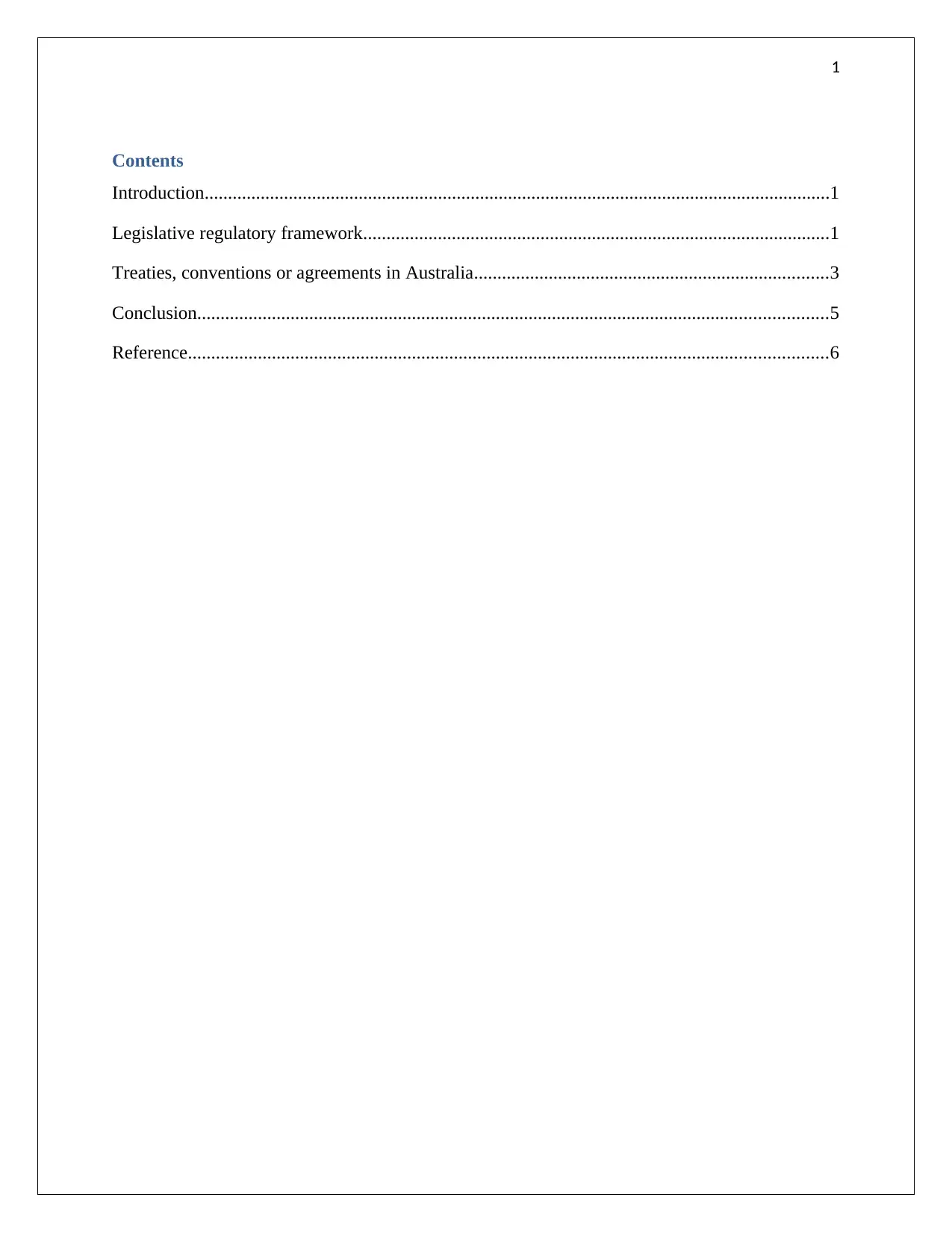
1
Contents
Introduction......................................................................................................................................1
Legislative regulatory framework....................................................................................................1
Treaties, conventions or agreements in Australia............................................................................3
Conclusion.......................................................................................................................................5
Reference.........................................................................................................................................6
Contents
Introduction......................................................................................................................................1
Legislative regulatory framework....................................................................................................1
Treaties, conventions or agreements in Australia............................................................................3
Conclusion.......................................................................................................................................5
Reference.........................................................................................................................................6
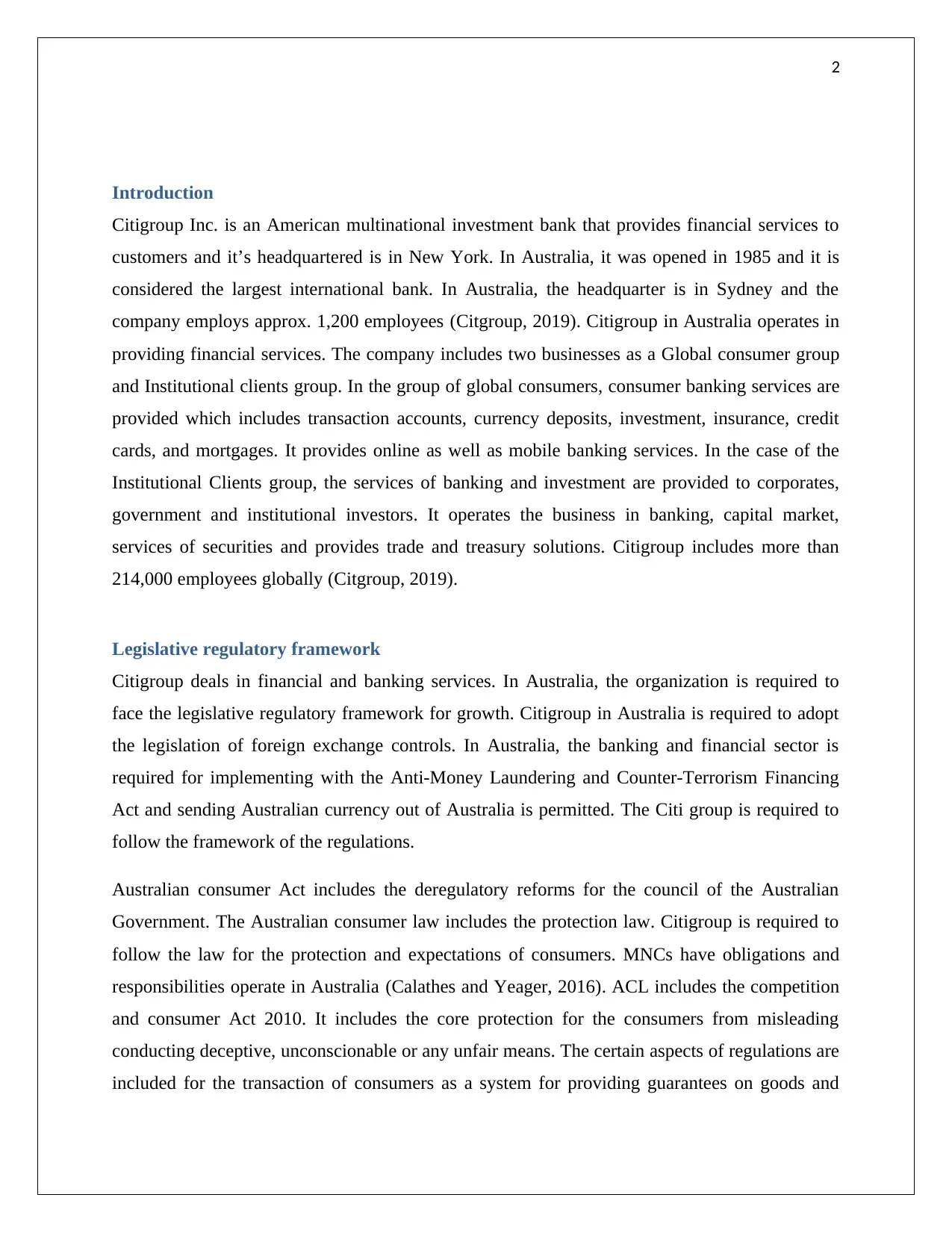
2
Introduction
Citigroup Inc. is an American multinational investment bank that provides financial services to
customers and it’s headquartered is in New York. In Australia, it was opened in 1985 and it is
considered the largest international bank. In Australia, the headquarter is in Sydney and the
company employs approx. 1,200 employees (Citgroup, 2019). Citigroup in Australia operates in
providing financial services. The company includes two businesses as a Global consumer group
and Institutional clients group. In the group of global consumers, consumer banking services are
provided which includes transaction accounts, currency deposits, investment, insurance, credit
cards, and mortgages. It provides online as well as mobile banking services. In the case of the
Institutional Clients group, the services of banking and investment are provided to corporates,
government and institutional investors. It operates the business in banking, capital market,
services of securities and provides trade and treasury solutions. Citigroup includes more than
214,000 employees globally (Citgroup, 2019).
Legislative regulatory framework
Citigroup deals in financial and banking services. In Australia, the organization is required to
face the legislative regulatory framework for growth. Citigroup in Australia is required to adopt
the legislation of foreign exchange controls. In Australia, the banking and financial sector is
required for implementing with the Anti-Money Laundering and Counter-Terrorism Financing
Act and sending Australian currency out of Australia is permitted. The Citi group is required to
follow the framework of the regulations.
Australian consumer Act includes the deregulatory reforms for the council of the Australian
Government. The Australian consumer law includes the protection law. Citigroup is required to
follow the law for the protection and expectations of consumers. MNCs have obligations and
responsibilities operate in Australia (Calathes and Yeager, 2016). ACL includes the competition
and consumer Act 2010. It includes the core protection for the consumers from misleading
conducting deceptive, unconscionable or any unfair means. The certain aspects of regulations are
included for the transaction of consumers as a system for providing guarantees on goods and
Introduction
Citigroup Inc. is an American multinational investment bank that provides financial services to
customers and it’s headquartered is in New York. In Australia, it was opened in 1985 and it is
considered the largest international bank. In Australia, the headquarter is in Sydney and the
company employs approx. 1,200 employees (Citgroup, 2019). Citigroup in Australia operates in
providing financial services. The company includes two businesses as a Global consumer group
and Institutional clients group. In the group of global consumers, consumer banking services are
provided which includes transaction accounts, currency deposits, investment, insurance, credit
cards, and mortgages. It provides online as well as mobile banking services. In the case of the
Institutional Clients group, the services of banking and investment are provided to corporates,
government and institutional investors. It operates the business in banking, capital market,
services of securities and provides trade and treasury solutions. Citigroup includes more than
214,000 employees globally (Citgroup, 2019).
Legislative regulatory framework
Citigroup deals in financial and banking services. In Australia, the organization is required to
face the legislative regulatory framework for growth. Citigroup in Australia is required to adopt
the legislation of foreign exchange controls. In Australia, the banking and financial sector is
required for implementing with the Anti-Money Laundering and Counter-Terrorism Financing
Act and sending Australian currency out of Australia is permitted. The Citi group is required to
follow the framework of the regulations.
Australian consumer Act includes the deregulatory reforms for the council of the Australian
Government. The Australian consumer law includes the protection law. Citigroup is required to
follow the law for the protection and expectations of consumers. MNCs have obligations and
responsibilities operate in Australia (Calathes and Yeager, 2016). ACL includes the competition
and consumer Act 2010. It includes the core protection for the consumers from misleading
conducting deceptive, unconscionable or any unfair means. The certain aspects of regulations are
included for the transaction of consumers as a system for providing guarantees on goods and
⊘ This is a preview!⊘
Do you want full access?
Subscribe today to unlock all pages.

Trusted by 1+ million students worldwide
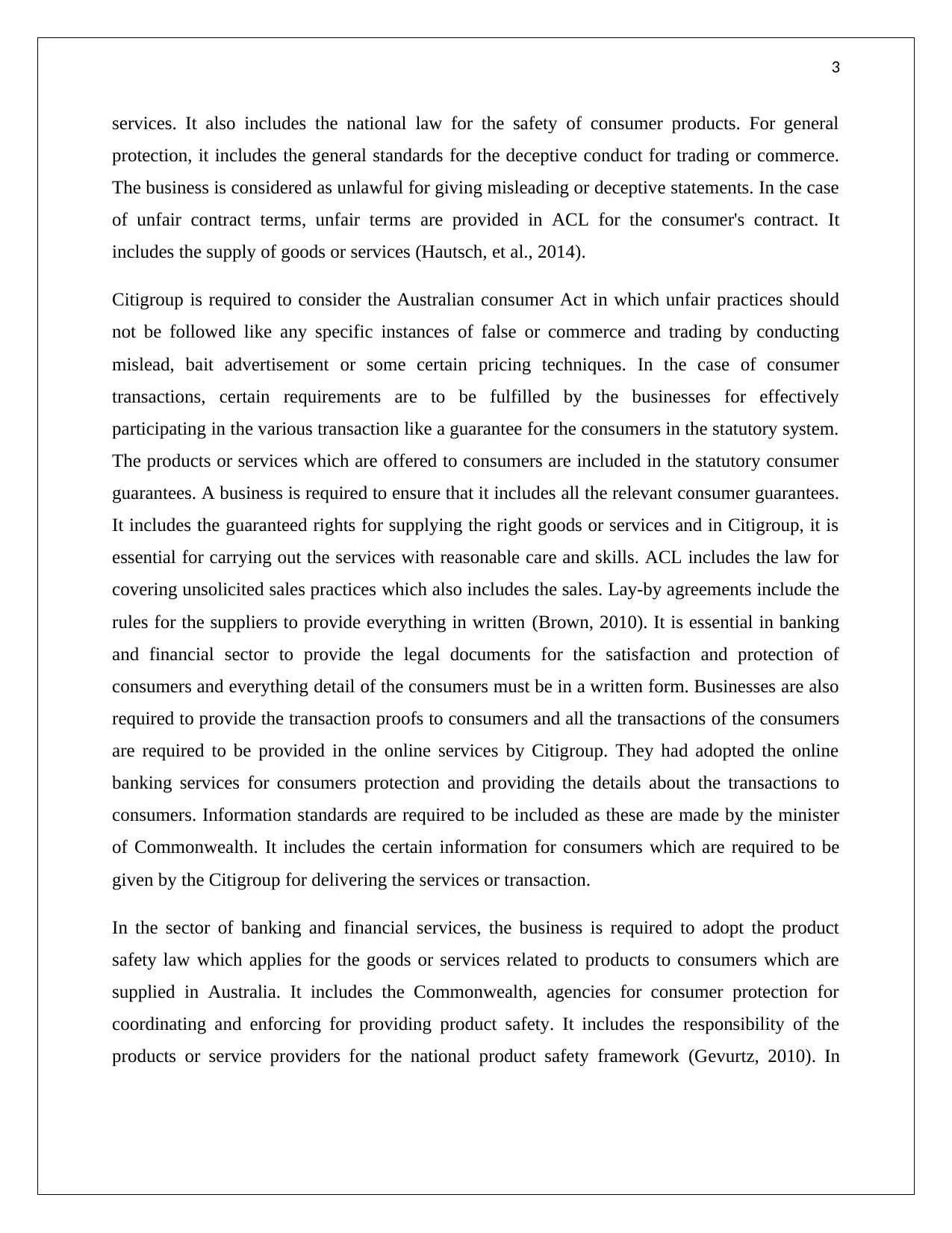
3
services. It also includes the national law for the safety of consumer products. For general
protection, it includes the general standards for the deceptive conduct for trading or commerce.
The business is considered as unlawful for giving misleading or deceptive statements. In the case
of unfair contract terms, unfair terms are provided in ACL for the consumer's contract. It
includes the supply of goods or services (Hautsch, et al., 2014).
Citigroup is required to consider the Australian consumer Act in which unfair practices should
not be followed like any specific instances of false or commerce and trading by conducting
mislead, bait advertisement or some certain pricing techniques. In the case of consumer
transactions, certain requirements are to be fulfilled by the businesses for effectively
participating in the various transaction like a guarantee for the consumers in the statutory system.
The products or services which are offered to consumers are included in the statutory consumer
guarantees. A business is required to ensure that it includes all the relevant consumer guarantees.
It includes the guaranteed rights for supplying the right goods or services and in Citigroup, it is
essential for carrying out the services with reasonable care and skills. ACL includes the law for
covering unsolicited sales practices which also includes the sales. Lay-by agreements include the
rules for the suppliers to provide everything in written (Brown, 2010). It is essential in banking
and financial sector to provide the legal documents for the satisfaction and protection of
consumers and everything detail of the consumers must be in a written form. Businesses are also
required to provide the transaction proofs to consumers and all the transactions of the consumers
are required to be provided in the online services by Citigroup. They had adopted the online
banking services for consumers protection and providing the details about the transactions to
consumers. Information standards are required to be included as these are made by the minister
of Commonwealth. It includes the certain information for consumers which are required to be
given by the Citigroup for delivering the services or transaction.
In the sector of banking and financial services, the business is required to adopt the product
safety law which applies for the goods or services related to products to consumers which are
supplied in Australia. It includes the Commonwealth, agencies for consumer protection for
coordinating and enforcing for providing product safety. It includes the responsibility of the
products or service providers for the national product safety framework (Gevurtz, 2010). In
services. It also includes the national law for the safety of consumer products. For general
protection, it includes the general standards for the deceptive conduct for trading or commerce.
The business is considered as unlawful for giving misleading or deceptive statements. In the case
of unfair contract terms, unfair terms are provided in ACL for the consumer's contract. It
includes the supply of goods or services (Hautsch, et al., 2014).
Citigroup is required to consider the Australian consumer Act in which unfair practices should
not be followed like any specific instances of false or commerce and trading by conducting
mislead, bait advertisement or some certain pricing techniques. In the case of consumer
transactions, certain requirements are to be fulfilled by the businesses for effectively
participating in the various transaction like a guarantee for the consumers in the statutory system.
The products or services which are offered to consumers are included in the statutory consumer
guarantees. A business is required to ensure that it includes all the relevant consumer guarantees.
It includes the guaranteed rights for supplying the right goods or services and in Citigroup, it is
essential for carrying out the services with reasonable care and skills. ACL includes the law for
covering unsolicited sales practices which also includes the sales. Lay-by agreements include the
rules for the suppliers to provide everything in written (Brown, 2010). It is essential in banking
and financial sector to provide the legal documents for the satisfaction and protection of
consumers and everything detail of the consumers must be in a written form. Businesses are also
required to provide the transaction proofs to consumers and all the transactions of the consumers
are required to be provided in the online services by Citigroup. They had adopted the online
banking services for consumers protection and providing the details about the transactions to
consumers. Information standards are required to be included as these are made by the minister
of Commonwealth. It includes the certain information for consumers which are required to be
given by the Citigroup for delivering the services or transaction.
In the sector of banking and financial services, the business is required to adopt the product
safety law which applies for the goods or services related to products to consumers which are
supplied in Australia. It includes the Commonwealth, agencies for consumer protection for
coordinating and enforcing for providing product safety. It includes the responsibility of the
products or service providers for the national product safety framework (Gevurtz, 2010). In
Paraphrase This Document
Need a fresh take? Get an instant paraphrase of this document with our AI Paraphraser
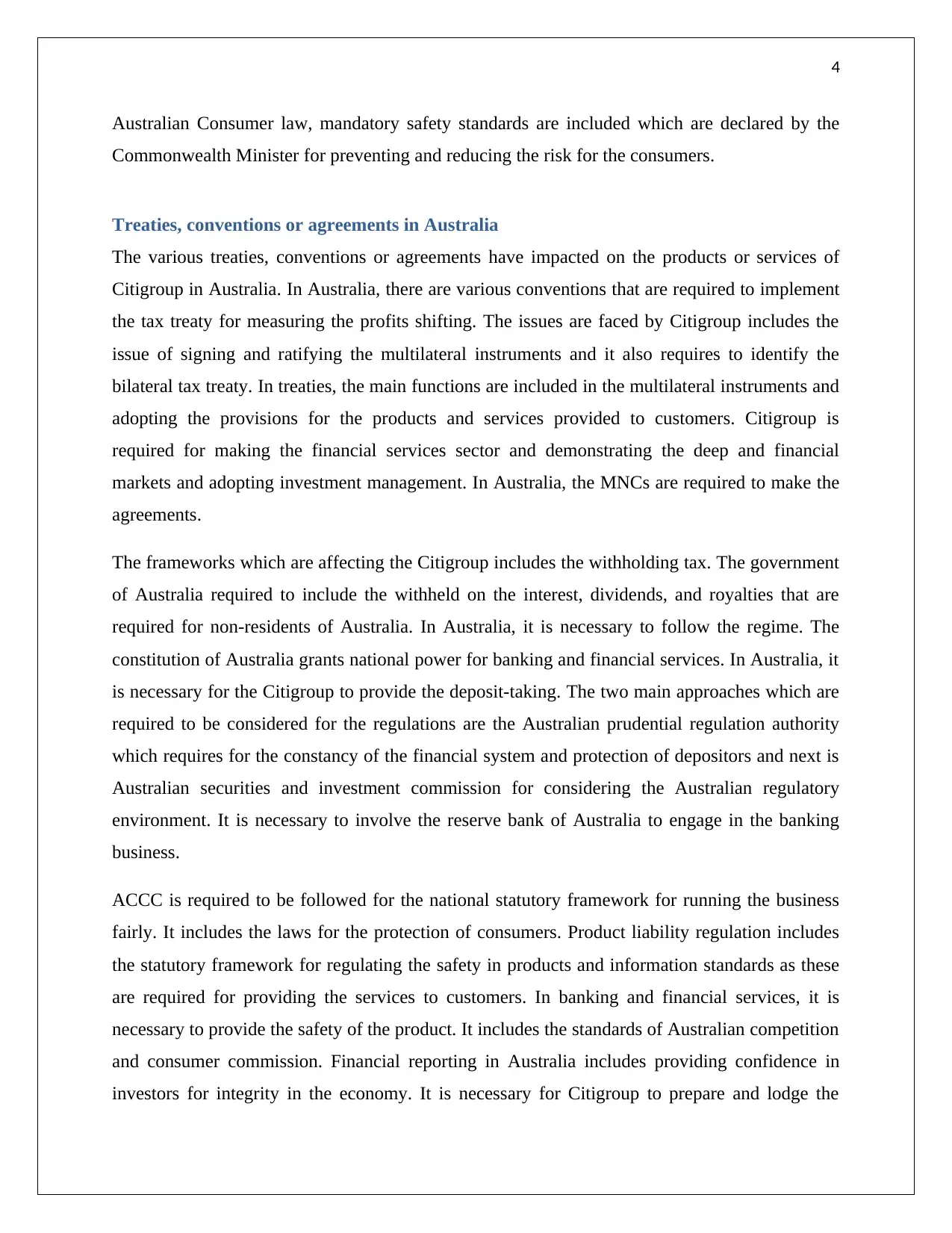
4
Australian Consumer law, mandatory safety standards are included which are declared by the
Commonwealth Minister for preventing and reducing the risk for the consumers.
Treaties, conventions or agreements in Australia
The various treaties, conventions or agreements have impacted on the products or services of
Citigroup in Australia. In Australia, there are various conventions that are required to implement
the tax treaty for measuring the profits shifting. The issues are faced by Citigroup includes the
issue of signing and ratifying the multilateral instruments and it also requires to identify the
bilateral tax treaty. In treaties, the main functions are included in the multilateral instruments and
adopting the provisions for the products and services provided to customers. Citigroup is
required for making the financial services sector and demonstrating the deep and financial
markets and adopting investment management. In Australia, the MNCs are required to make the
agreements.
The frameworks which are affecting the Citigroup includes the withholding tax. The government
of Australia required to include the withheld on the interest, dividends, and royalties that are
required for non-residents of Australia. In Australia, it is necessary to follow the regime. The
constitution of Australia grants national power for banking and financial services. In Australia, it
is necessary for the Citigroup to provide the deposit-taking. The two main approaches which are
required to be considered for the regulations are the Australian prudential regulation authority
which requires for the constancy of the financial system and protection of depositors and next is
Australian securities and investment commission for considering the Australian regulatory
environment. It is necessary to involve the reserve bank of Australia to engage in the banking
business.
ACCC is required to be followed for the national statutory framework for running the business
fairly. It includes the laws for the protection of consumers. Product liability regulation includes
the statutory framework for regulating the safety in products and information standards as these
are required for providing the services to customers. In banking and financial services, it is
necessary to provide the safety of the product. It includes the standards of Australian competition
and consumer commission. Financial reporting in Australia includes providing confidence in
investors for integrity in the economy. It is necessary for Citigroup to prepare and lodge the
Australian Consumer law, mandatory safety standards are included which are declared by the
Commonwealth Minister for preventing and reducing the risk for the consumers.
Treaties, conventions or agreements in Australia
The various treaties, conventions or agreements have impacted on the products or services of
Citigroup in Australia. In Australia, there are various conventions that are required to implement
the tax treaty for measuring the profits shifting. The issues are faced by Citigroup includes the
issue of signing and ratifying the multilateral instruments and it also requires to identify the
bilateral tax treaty. In treaties, the main functions are included in the multilateral instruments and
adopting the provisions for the products and services provided to customers. Citigroup is
required for making the financial services sector and demonstrating the deep and financial
markets and adopting investment management. In Australia, the MNCs are required to make the
agreements.
The frameworks which are affecting the Citigroup includes the withholding tax. The government
of Australia required to include the withheld on the interest, dividends, and royalties that are
required for non-residents of Australia. In Australia, it is necessary to follow the regime. The
constitution of Australia grants national power for banking and financial services. In Australia, it
is necessary for the Citigroup to provide the deposit-taking. The two main approaches which are
required to be considered for the regulations are the Australian prudential regulation authority
which requires for the constancy of the financial system and protection of depositors and next is
Australian securities and investment commission for considering the Australian regulatory
environment. It is necessary to involve the reserve bank of Australia to engage in the banking
business.
ACCC is required to be followed for the national statutory framework for running the business
fairly. It includes the laws for the protection of consumers. Product liability regulation includes
the statutory framework for regulating the safety in products and information standards as these
are required for providing the services to customers. In banking and financial services, it is
necessary to provide the safety of the product. It includes the standards of Australian competition
and consumer commission. Financial reporting in Australia includes providing confidence in
investors for integrity in the economy. It is necessary for Citigroup to prepare and lodge the
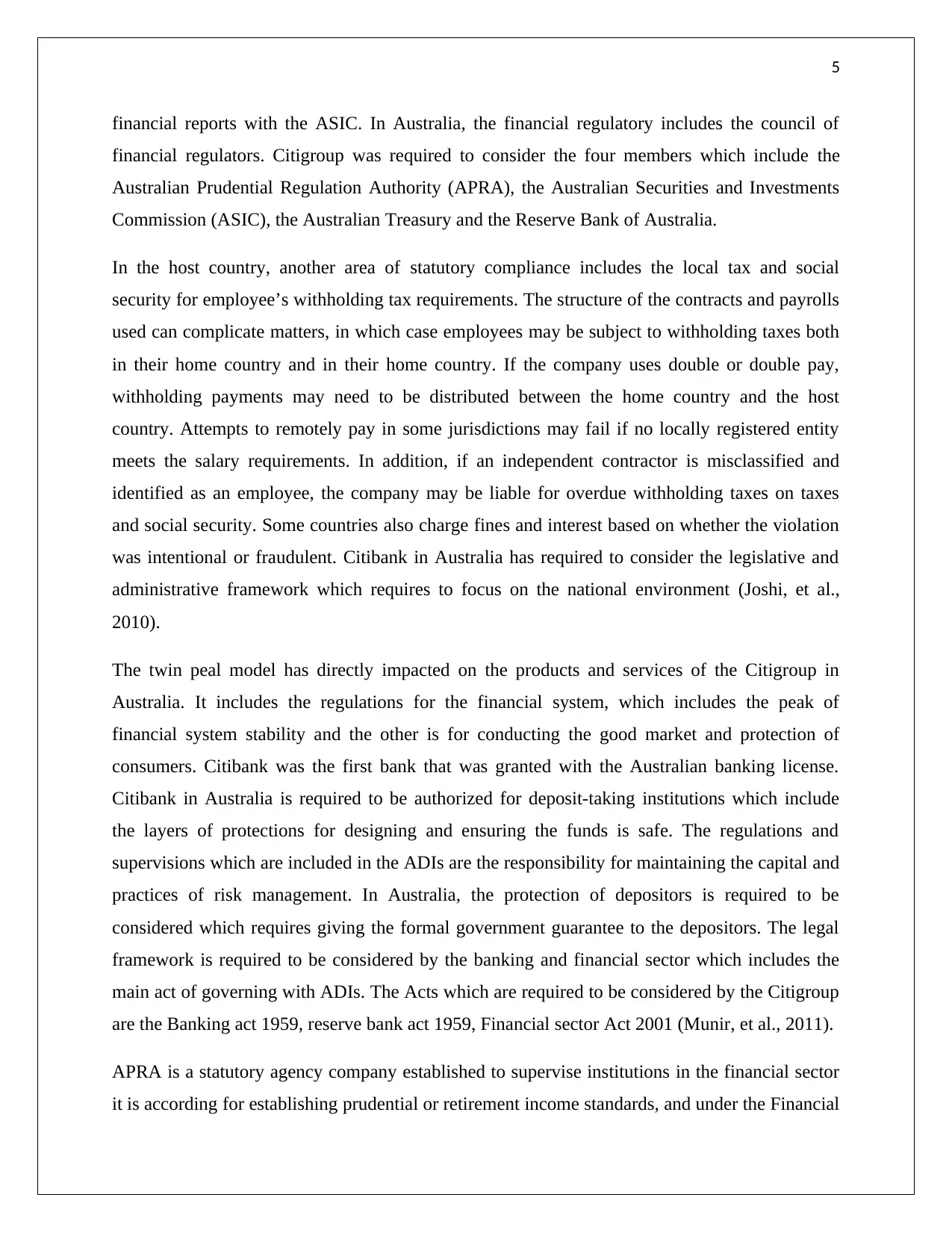
5
financial reports with the ASIC. In Australia, the financial regulatory includes the council of
financial regulators. Citigroup was required to consider the four members which include the
Australian Prudential Regulation Authority (APRA), the Australian Securities and Investments
Commission (ASIC), the Australian Treasury and the Reserve Bank of Australia.
In the host country, another area of statutory compliance includes the local tax and social
security for employee’s withholding tax requirements. The structure of the contracts and payrolls
used can complicate matters, in which case employees may be subject to withholding taxes both
in their home country and in their home country. If the company uses double or double pay,
withholding payments may need to be distributed between the home country and the host
country. Attempts to remotely pay in some jurisdictions may fail if no locally registered entity
meets the salary requirements. In addition, if an independent contractor is misclassified and
identified as an employee, the company may be liable for overdue withholding taxes on taxes
and social security. Some countries also charge fines and interest based on whether the violation
was intentional or fraudulent. Citibank in Australia has required to consider the legislative and
administrative framework which requires to focus on the national environment (Joshi, et al.,
2010).
The twin peal model has directly impacted on the products and services of the Citigroup in
Australia. It includes the regulations for the financial system, which includes the peak of
financial system stability and the other is for conducting the good market and protection of
consumers. Citibank was the first bank that was granted with the Australian banking license.
Citibank in Australia is required to be authorized for deposit-taking institutions which include
the layers of protections for designing and ensuring the funds is safe. The regulations and
supervisions which are included in the ADIs are the responsibility for maintaining the capital and
practices of risk management. In Australia, the protection of depositors is required to be
considered which requires giving the formal government guarantee to the depositors. The legal
framework is required to be considered by the banking and financial sector which includes the
main act of governing with ADIs. The Acts which are required to be considered by the Citigroup
are the Banking act 1959, reserve bank act 1959, Financial sector Act 2001 (Munir, et al., 2011).
APRA is a statutory agency company established to supervise institutions in the financial sector
it is according for establishing prudential or retirement income standards, and under the Financial
financial reports with the ASIC. In Australia, the financial regulatory includes the council of
financial regulators. Citigroup was required to consider the four members which include the
Australian Prudential Regulation Authority (APRA), the Australian Securities and Investments
Commission (ASIC), the Australian Treasury and the Reserve Bank of Australia.
In the host country, another area of statutory compliance includes the local tax and social
security for employee’s withholding tax requirements. The structure of the contracts and payrolls
used can complicate matters, in which case employees may be subject to withholding taxes both
in their home country and in their home country. If the company uses double or double pay,
withholding payments may need to be distributed between the home country and the host
country. Attempts to remotely pay in some jurisdictions may fail if no locally registered entity
meets the salary requirements. In addition, if an independent contractor is misclassified and
identified as an employee, the company may be liable for overdue withholding taxes on taxes
and social security. Some countries also charge fines and interest based on whether the violation
was intentional or fraudulent. Citibank in Australia has required to consider the legislative and
administrative framework which requires to focus on the national environment (Joshi, et al.,
2010).
The twin peal model has directly impacted on the products and services of the Citigroup in
Australia. It includes the regulations for the financial system, which includes the peak of
financial system stability and the other is for conducting the good market and protection of
consumers. Citibank was the first bank that was granted with the Australian banking license.
Citibank in Australia is required to be authorized for deposit-taking institutions which include
the layers of protections for designing and ensuring the funds is safe. The regulations and
supervisions which are included in the ADIs are the responsibility for maintaining the capital and
practices of risk management. In Australia, the protection of depositors is required to be
considered which requires giving the formal government guarantee to the depositors. The legal
framework is required to be considered by the banking and financial sector which includes the
main act of governing with ADIs. The Acts which are required to be considered by the Citigroup
are the Banking act 1959, reserve bank act 1959, Financial sector Act 2001 (Munir, et al., 2011).
APRA is a statutory agency company established to supervise institutions in the financial sector
it is according for establishing prudential or retirement income standards, and under the Financial
⊘ This is a preview!⊘
Do you want full access?
Subscribe today to unlock all pages.

Trusted by 1+ million students worldwide
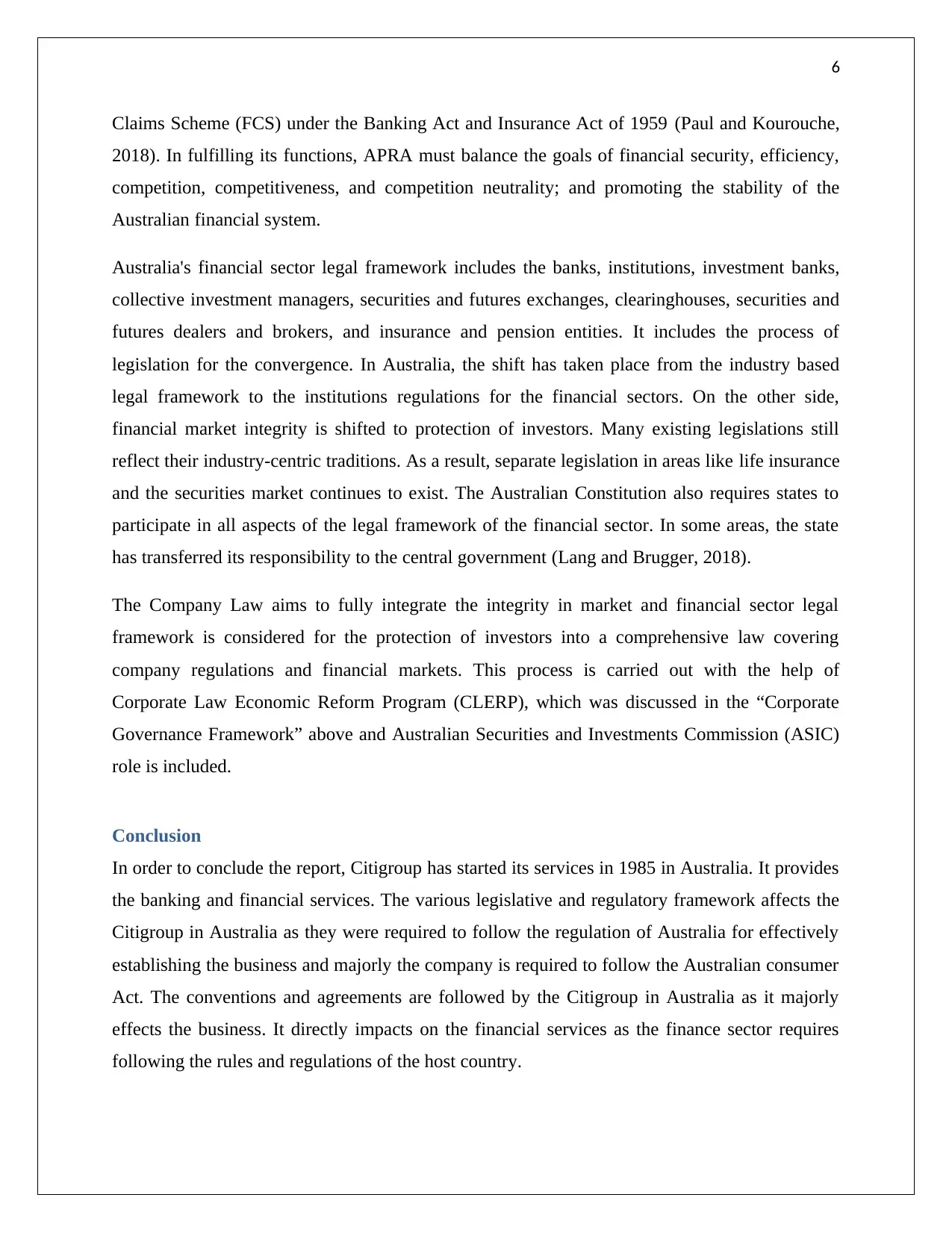
6
Claims Scheme (FCS) under the Banking Act and Insurance Act of 1959 (Paul and Kourouche,
2018). In fulfilling its functions, APRA must balance the goals of financial security, efficiency,
competition, competitiveness, and competition neutrality; and promoting the stability of the
Australian financial system.
Australia's financial sector legal framework includes the banks, institutions, investment banks,
collective investment managers, securities and futures exchanges, clearinghouses, securities and
futures dealers and brokers, and insurance and pension entities. It includes the process of
legislation for the convergence. In Australia, the shift has taken place from the industry based
legal framework to the institutions regulations for the financial sectors. On the other side,
financial market integrity is shifted to protection of investors. Many existing legislations still
reflect their industry-centric traditions. As a result, separate legislation in areas like life insurance
and the securities market continues to exist. The Australian Constitution also requires states to
participate in all aspects of the legal framework of the financial sector. In some areas, the state
has transferred its responsibility to the central government (Lang and Brugger, 2018).
The Company Law aims to fully integrate the integrity in market and financial sector legal
framework is considered for the protection of investors into a comprehensive law covering
company regulations and financial markets. This process is carried out with the help of
Corporate Law Economic Reform Program (CLERP), which was discussed in the “Corporate
Governance Framework” above and Australian Securities and Investments Commission (ASIC)
role is included.
Conclusion
In order to conclude the report, Citigroup has started its services in 1985 in Australia. It provides
the banking and financial services. The various legislative and regulatory framework affects the
Citigroup in Australia as they were required to follow the regulation of Australia for effectively
establishing the business and majorly the company is required to follow the Australian consumer
Act. The conventions and agreements are followed by the Citigroup in Australia as it majorly
effects the business. It directly impacts on the financial services as the finance sector requires
following the rules and regulations of the host country.
Claims Scheme (FCS) under the Banking Act and Insurance Act of 1959 (Paul and Kourouche,
2018). In fulfilling its functions, APRA must balance the goals of financial security, efficiency,
competition, competitiveness, and competition neutrality; and promoting the stability of the
Australian financial system.
Australia's financial sector legal framework includes the banks, institutions, investment banks,
collective investment managers, securities and futures exchanges, clearinghouses, securities and
futures dealers and brokers, and insurance and pension entities. It includes the process of
legislation for the convergence. In Australia, the shift has taken place from the industry based
legal framework to the institutions regulations for the financial sectors. On the other side,
financial market integrity is shifted to protection of investors. Many existing legislations still
reflect their industry-centric traditions. As a result, separate legislation in areas like life insurance
and the securities market continues to exist. The Australian Constitution also requires states to
participate in all aspects of the legal framework of the financial sector. In some areas, the state
has transferred its responsibility to the central government (Lang and Brugger, 2018).
The Company Law aims to fully integrate the integrity in market and financial sector legal
framework is considered for the protection of investors into a comprehensive law covering
company regulations and financial markets. This process is carried out with the help of
Corporate Law Economic Reform Program (CLERP), which was discussed in the “Corporate
Governance Framework” above and Australian Securities and Investments Commission (ASIC)
role is included.
Conclusion
In order to conclude the report, Citigroup has started its services in 1985 in Australia. It provides
the banking and financial services. The various legislative and regulatory framework affects the
Citigroup in Australia as they were required to follow the regulation of Australia for effectively
establishing the business and majorly the company is required to follow the Australian consumer
Act. The conventions and agreements are followed by the Citigroup in Australia as it majorly
effects the business. It directly impacts on the financial services as the finance sector requires
following the rules and regulations of the host country.
Paraphrase This Document
Need a fresh take? Get an instant paraphrase of this document with our AI Paraphraser
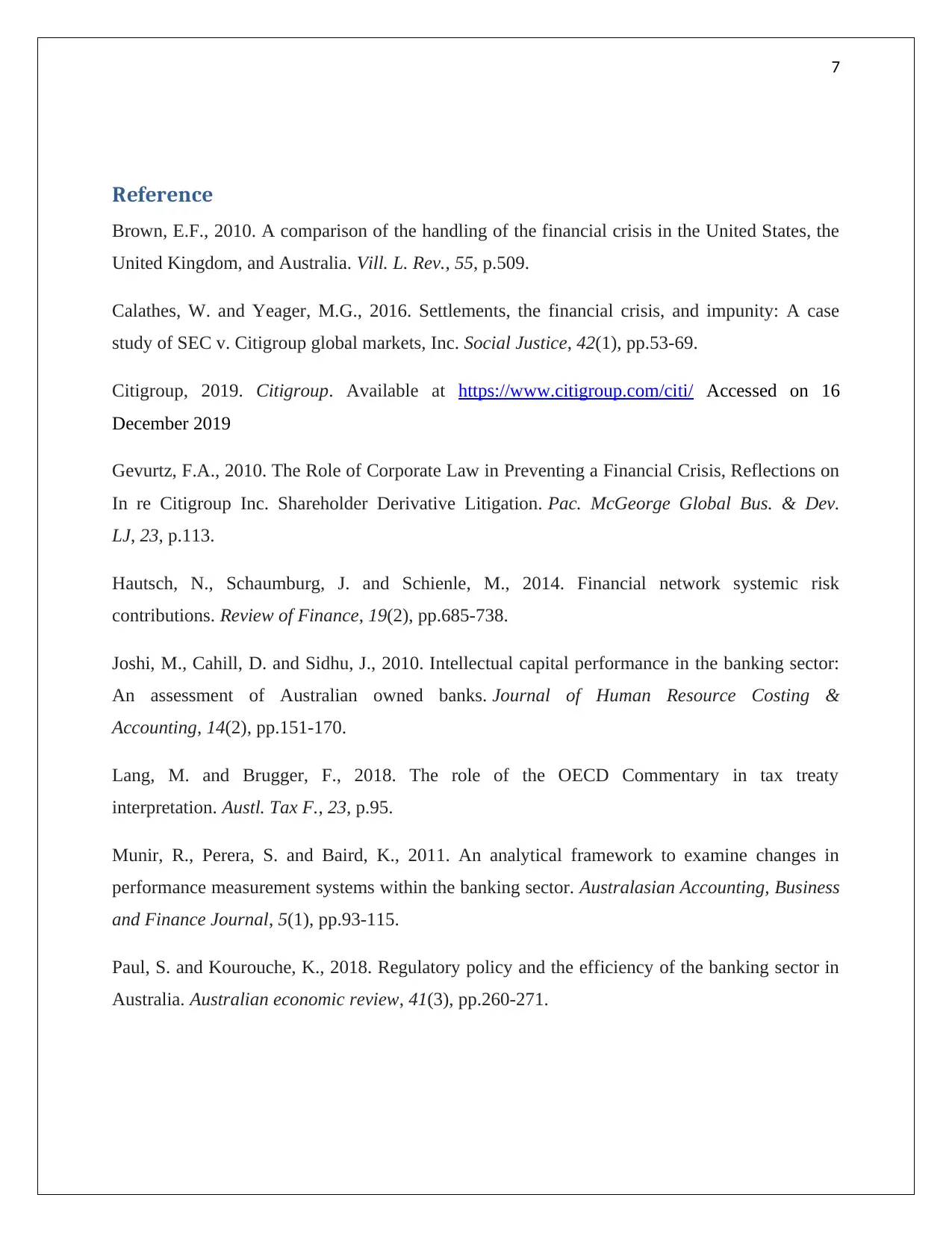
7
Reference
Brown, E.F., 2010. A comparison of the handling of the financial crisis in the United States, the
United Kingdom, and Australia. Vill. L. Rev., 55, p.509.
Calathes, W. and Yeager, M.G., 2016. Settlements, the financial crisis, and impunity: A case
study of SEC v. Citigroup global markets, Inc. Social Justice, 42(1), pp.53-69.
Citigroup, 2019. Citigroup. Available at https://www.citigroup.com/citi/ Accessed on 16
December 2019
Gevurtz, F.A., 2010. The Role of Corporate Law in Preventing a Financial Crisis, Reflections on
In re Citigroup Inc. Shareholder Derivative Litigation. Pac. McGeorge Global Bus. & Dev.
LJ, 23, p.113.
Hautsch, N., Schaumburg, J. and Schienle, M., 2014. Financial network systemic risk
contributions. Review of Finance, 19(2), pp.685-738.
Joshi, M., Cahill, D. and Sidhu, J., 2010. Intellectual capital performance in the banking sector:
An assessment of Australian owned banks. Journal of Human Resource Costing &
Accounting, 14(2), pp.151-170.
Lang, M. and Brugger, F., 2018. The role of the OECD Commentary in tax treaty
interpretation. Austl. Tax F., 23, p.95.
Munir, R., Perera, S. and Baird, K., 2011. An analytical framework to examine changes in
performance measurement systems within the banking sector. Australasian Accounting, Business
and Finance Journal, 5(1), pp.93-115.
Paul, S. and Kourouche, K., 2018. Regulatory policy and the efficiency of the banking sector in
Australia. Australian economic review, 41(3), pp.260-271.
Reference
Brown, E.F., 2010. A comparison of the handling of the financial crisis in the United States, the
United Kingdom, and Australia. Vill. L. Rev., 55, p.509.
Calathes, W. and Yeager, M.G., 2016. Settlements, the financial crisis, and impunity: A case
study of SEC v. Citigroup global markets, Inc. Social Justice, 42(1), pp.53-69.
Citigroup, 2019. Citigroup. Available at https://www.citigroup.com/citi/ Accessed on 16
December 2019
Gevurtz, F.A., 2010. The Role of Corporate Law in Preventing a Financial Crisis, Reflections on
In re Citigroup Inc. Shareholder Derivative Litigation. Pac. McGeorge Global Bus. & Dev.
LJ, 23, p.113.
Hautsch, N., Schaumburg, J. and Schienle, M., 2014. Financial network systemic risk
contributions. Review of Finance, 19(2), pp.685-738.
Joshi, M., Cahill, D. and Sidhu, J., 2010. Intellectual capital performance in the banking sector:
An assessment of Australian owned banks. Journal of Human Resource Costing &
Accounting, 14(2), pp.151-170.
Lang, M. and Brugger, F., 2018. The role of the OECD Commentary in tax treaty
interpretation. Austl. Tax F., 23, p.95.
Munir, R., Perera, S. and Baird, K., 2011. An analytical framework to examine changes in
performance measurement systems within the banking sector. Australasian Accounting, Business
and Finance Journal, 5(1), pp.93-115.
Paul, S. and Kourouche, K., 2018. Regulatory policy and the efficiency of the banking sector in
Australia. Australian economic review, 41(3), pp.260-271.
1 out of 8
Related Documents
Your All-in-One AI-Powered Toolkit for Academic Success.
+13062052269
info@desklib.com
Available 24*7 on WhatsApp / Email
![[object Object]](/_next/static/media/star-bottom.7253800d.svg)
Unlock your academic potential
Copyright © 2020–2026 A2Z Services. All Rights Reserved. Developed and managed by ZUCOL.





